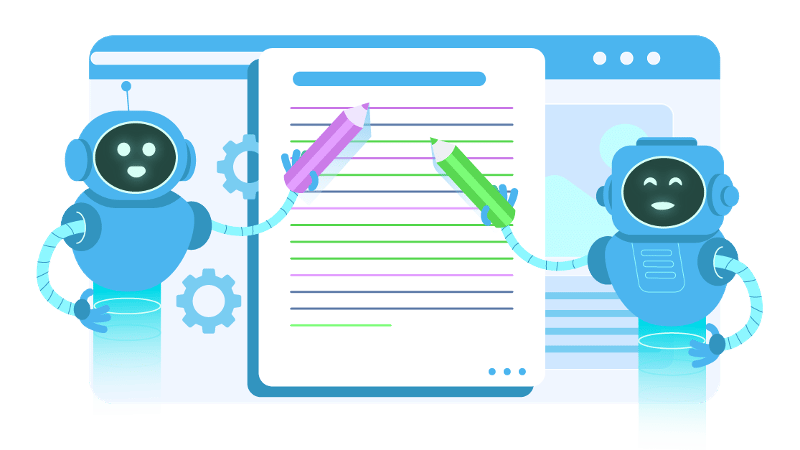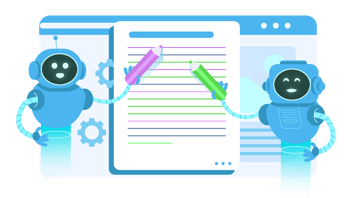Using AI in Content Marketing: How AI Revolutionizes Content Creation
With the rapid advancement of artificial intelligence (AI), the content marketing landscape is undergoing a profound transformation. AI offers unparalleled opportunities for content marketers, from analyzing vast amounts of data to generate compelling ideas to automating content creation and optimizing for search engine visibility.
Join us as we unravel how AI reshapes the content marketing landscape and drives unprecedented results.

The Role of AI in Content Marketing
Content marketing already plays a crucial role in engaging and capturing the attention of target audiences. With the advent of artificial intelligence (AI), content marketers now have a powerful ally that can revolutionize the content creation process and drive impactful results. AI complements and enhances content marketing strategies by providing valuable insights, streamlining processes, and enabling data-driven decision-making.
The use of AI in content marketing is expected to grow by 35% in one year.
Firstly, it is crucial to understand the concept of content marketing. Content marketing involves creating and distributing valuable, relevant, consistent content to attract and retain a clearly defined audience. It educates, entertains, and inspires, building trust and fostering long-term customer relationships.
AI has emerged as a game-changer in content marketing, empowering marketers with tools and techniques that were once unimaginable. By harnessing the power of AI, content marketers gain access to vast amounts of data, enabling them to gain deep insights into customer preferences, behavior patterns, and content gaps.
The average ROI for AI-powered content marketing campaigns is 178%.
The three key areas where AI proves invaluable in content marketing are:
-
Content ideation
-
Content creation
-
Content optimization
By leveraging AI, content marketers can tap into vast data resources, generate compelling content, automate content creation, and optimize content for better search engine visibility and user engagement. Integrating AI into content marketing strategies allows marketers to harness the full potential of technology to drive impactful results, build customer relationships, and stay ahead in an increasingly competitive digital landscape. As AI continues to advance, the role of AI in content marketing will only grow, opening up new possibilities and revolutionizing the content creation process even further.
Now, let's dive into the specifics.
1. Content Ideation with AI
Content ideation is a critical step in content marketing, and AI plays a pivotal role in transforming this aspect. With its ability to analyze vast amounts of data and identify emerging trends and customer preferences, AI-powered platforms provide valuable assistance to marketers in generating compelling content ideas and editorial calendars.
AI algorithms can sift through diverse data sources, including social media platforms, online forums, industry news, and customer feedback, to extract valuable insights. By leveraging AI, marketers can better understand their target audience's interests, pain points, and preferences, a foundation for ideating relevant and engaging content.
Here are some ways in which marketers can harness AI for content ideation:
-
Data-driven trend analysis: AI can analyze real-time data to identify emerging trends in various industries or niches. Marketers can feed prompts like "latest trends in [industry/niche]" or "what are customers talking about in [topic/industry]" into AI platforms to gain insights into trending topics and create content that aligns with the interests of their target audience.
-
Customer sentiment analysis: AI-powered platforms can analyze customer sentiment by examining customer reviews, social media conversations, and feedback. Marketers can input prompts like "customer opinions on [product/service/industry]" or "what are customers saying about [brand/topic]" to gauge the sentiment surrounding their offerings and develop content that addresses customers' concerns or interests.
-
Competitor analysis: AI can assist in analyzing competitors' content strategies, and identifying gaps or opportunities for differentiation. Marketers can provide prompts such as "top-performing content from [competitor]" or "content gaps in [industry/niche]" to gather insights and generate unique content ideas that stand out in the market.
-
Keyword research: AI platforms can analyze search engine data and user queries to identify relevant keywords and topics with high search volumes. Marketers can input prompts like "popular keywords in [industry/niche]" or "what questions are customers asking about [topic/industry]" to uncover keyword opportunities and create content optimized for search engines.
-
Personalization and audience segmentation: AI algorithms can segment audiences based on demographics, interests, and behavior patterns. Marketers can input prompts like "content ideas for [specific audience segment]" or "how to personalize content for [target audience]" to generate ideas that resonate with specific customer segments and enhance engagement.
By leveraging the power of AI in content ideation, marketers can access valuable insights, stay ahead of trends, and create content that aligns with the interests and preferences of their target audience. AI-powered platforms are invaluable tools, providing data-driven prompts and recommendations that drive the ideation process and empower marketers to produce compelling and impactful content.
2. Content Creation with AI
Content creation is a labor-intensive process that requires time, effort, and creativity. However, with the advent of artificial intelligence (AI), content creators now have access to powerful tools and technologies that streamline and enhance the content creation process.
AI, particularly Natural Language Generation (NLG) algorithms, can analyze data, extract insights, and generate human-like text. This capability enables AI-powered platforms to automate content creation, producing high-quality content at scale.
This capability saves time and resources and ensures consistent content creation across various channels. AI-powered content creation tools assist in generating articles, blog posts, social media updates, and even product descriptions, allowing marketers to focus on strategy and creativity.
In addition to these benefits, here's how AI is revolutionizing content creation:
-
Automated content generation: AI platforms with NLG algorithms can automatically generate written content, including articles, blog posts, product descriptions, and social media updates. Marketers can input prompts, such as critical points to make, data sets, or desired tone, into the AI platform, which uses machine learning to generate coherent and engaging content. This automation saves time and resources while ensuring consistent content production.
-
Personalized content: AI algorithms can analyze user data, such as preferences, behavior patterns, and demographics, to generate personalized content tailored to individual users. By providing prompts like "personalized content for [audience segment]" or "how to customize content for [specific audience]," marketers can leverage AI platforms to deliver highly relevant and targeted content that resonates with their audience.
-
Multilingual content: AI-powered platforms can overcome language barriers by providing translation and localization capabilities. Marketers can input content prompts in one language and utilize AI algorithms to generate equivalent content in multiple languages, expanding their reach to global audiences.
-
Content enhancement and optimization: AI can analyze existing content and provide suggestions for improvement. Marketers can input prompts like "content optimization tips" or "how to improve content readability" to receive AI-generated recommendations on enhancing content structure, grammar, readability, and SEO. This capability ensures that the content meets industry standards and maximizes its impact on search engine rankings and user engagement.
-
Creative support: AI can act as a creative collaborator by assisting in brainstorming sessions and offering content ideas for social media. Marketers can input prompts like "content ideas for [topic/industry]" or "creative inspiration for [campaign/theme]" to receive AI-generated suggestions and expand their creative horizons.
Several companies have already embraced AI for content creation. For example, Forbes, a renowned media company, utilizes AI to create data-driven news articles on financial markets. These articles are generated in real-time, incorporating the latest market trends and insights. By automating content creation through AI, Forbes can deliver timely, accurate, and personalized content to its readers.
3. Content Optimization with AI
Content optimization is another area where AI is revolutionizing the content marketing process. AI-driven tools analyze content performance, search engine rankings, and user engagement metrics to optimize content for better visibility and increased conversions. These tools can suggest keywords, provide readability scores, and recommend improvements to enhance the overall quality of the content.
Here's how AI is revolutionizing content optimization:
-
SEO optimization: AI-powered platforms can analyze content and provide valuable recommendations for optimizing it for search engine visibility. By inputting prompts like "SEO optimization tips" or "how to improve search rankings," content marketers can leverage AI algorithms to receive insights on keyword usage, meta tags, headings, and other SEO factors. These recommendations ensure that content aligns with search engine algorithms, increasing its chances of ranking higher in search results.
-
Content performance analysis: AI platforms can analyze content performance metrics, such as click-through rates, time on page, and bounce rates, to evaluate the effectiveness of content. By inputting prompts like "content performance analysis" or "how to measure content engagement," marketers can leverage AI to gain insights into what aspects of their content resonate with audiences and make data-driven decisions to optimize future content.
-
Readability and grammar checks: AI algorithms can assess content readability and grammar, providing recommendations for improvement. Marketers can input prompts like "content readability analysis" or "how to enhance content grammar" to receive AI-generated suggestions on sentence structure, vocabulary usage, and overall readability. This capability ensures content is easily understandable and engaging to the target audience.
-
A/B testing and personalization: AI-driven platforms can facilitate A/B testing by automating the process of creating and analyzing multiple versions of content. Marketers can input prompts like "A/B testing for content" or "how to personalize content for different segments" to leverage AI algorithms that generate personalized variations of content based on user preferences, behavior, or demographics. By analyzing the performance of different versions, content marketers can optimize content to resonate with specific audience segments and increase engagement.
-
Content distribution and targeting: AI can assist in content distribution by analyzing user data and identifying the most appropriate channels and timing for content promotion. Marketers can input prompts like "content distribution strategies" or "how to target content to the right audience" to receive AI-generated recommendations on channel selection, scheduling, and audience targeting. This capability enables marketers to reach the right audience at the right time, increasing the likelihood of content engagement and conversions.
Companies like HubSpot have integrated AI into their content optimization efforts. HubSpot's Content Strategy tool uses AI to analyze content performance, identify gaps, and provide recommendations to improve SEO and engagement. By leveraging AI-driven insights, content marketers can optimize their content for maximum impact and achieve better search engine rankings.
AI Tools for Content Marketing
The field of content marketing has seen a surge in the development of AI-powered tools and platforms. These tools leverage the capabilities of artificial intelligence to enhance various aspects of content marketing, from ideation to creation and optimization. Here are some notable AI tools that content marketers can leverage, along with their benefits:
-
Chat GPT: Developed by OpenAI, Chat GPT is an advanced language model that can generate human-like text based on given prompts. Content marketers can utilize Chat GPT to brainstorm ideas, create engaging content, and personalize interactions with their audience. The tool's natural language processing capabilities enable it to understand and respond to user inputs, making it a valuable resource for content creation and customer engagement.
-
Gemini: A large language model developed by Google AI. Trained on a massive dataset of text and code and connected with the most common search engine, Gemini can generate various types of creative content, translate languages, answer questions comprehensively, and follow instructions thoughtfully. Although it is still under development, Gemini has learned to perform many tasks, including generating poems, code, scripts, musical pieces, emails, letters, and more.
-
HubSpot AI: HubSpot, the renowned marketing platform, incorporates AI-driven tools to assist with content marketing efforts. HubSpot's AI capabilities include content strategy analysis, SEO recommendations, and personalized content suggestions. Marketers can leverage these tools to optimize their content, improve search engine visibility, and deliver personalized experiences to their audience.
-
BuzzSumo: BuzzSumo is a popular AI-powered platform that helps content marketers identify trending topics and influential content in various industries. BuzzSumo provides valuable insights into what content resonates with audiences by analyzing social media engagement and search data. Marketers can leverage this information to generate content ideas, understand industry trends, and identify key influencers for collaboration opportunities.
-
MarketMuse: MarketMuse utilizes AI to provide content marketers with recommendations for optimizing their content. The platform analyzes existing content, identifies gaps, and suggests topics to cover, helping marketers create comprehensive and authoritative content. MarketMuse's AI-driven insights enhance content quality, improve search engine rankings, and drive higher engagement.
-
Acrolinx: Acrolinx is an AI-powered content optimization platform that assists marketers in maintaining consistent brand messaging and ensuring content quality. The tool analyzes content for grammar, style, and tone, providing recommendations for improvement. By leveraging Acrolinx, marketers can enhance content readability, enforce brand guidelines, and maintain a consistent voice across all content assets.
These AI tools empower content marketers by providing valuable insights, automating processes, enhancing content quality, and optimizing search engines and audience engagement. Leveraging these tools, marketers can streamline their content marketing efforts, improve efficiency, and drive impactful results in an increasingly competitive landscape.
Embracing the AI Revolution: Transforming Content Marketing with Artificial Intelligence
Integrating AI in content marketing has revolutionized the industry, transforming how content is ideated, created, and optimized. AI-powered tools provide valuable insights, automation capabilities, and personalization options, empowering marketers to enhance their strategies, engage with their audience, and drive better results. As AI advances, content marketers can leverage these tools to stay ahead in the dynamic digital landscape and deliver impactful content experiences.
Ready to take the next step in your content marketing efforts?
This content is also available in:
- German: KI im Content Marketing: Wie KI die Content-Erstellung revolutioniert
- Spanish: Uso de la IA en el content marketing: IA y la creación de contenidos
- French: Comment l'IA révolutionne la création de contenu
- Italian: Utilizzo dell'IA nel marketing: Rivoluziona la creazione di contenuti
- Romanian: AI în content marketing: cum revoluționează AI crearea de conținut
- Chinese: 在内容营销中使用人工智能:人工智能如何彻底改变内容创作









Leave a Comment